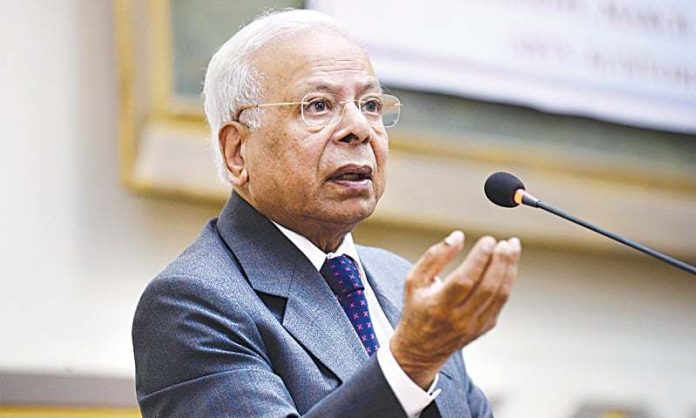ISLAMABAD: Former Governor State Bank of Pakistan (SBP) Dr Ishrat Hussain said on Thursday that Pakistan has a very high cost of production particularly due to high gas and electricity prices.
Speaking at a roundtable on open trade organised by PRIME Institute here at a local hotel, he said that the domestic consumers’ energy bills are being subsidised by the industry, and this happens only in Pakistan. He was of the view that in the sector of textiles, the world around us is moving towards man-made mix fibres.
Dr Ishrat lamented that Pakistan continues to be unable to exploit such tariff lines which face zero tariffs in GSP Plus. He claimed that there is too much of a blame game going on in the country, with the industry blaming the government and vice versa. He also criticised the taxation system, which he said penalises formal tax compliant firms and places those that are out of the tax net at an advantage. After the 18th constitutional amendment, the four provinces have started collecting their own GST on services. So the tax system has now become more dominant for a normal businessman.
The government does not realise that high tariff rates actually act as a tax on exports. He quoted a World Bank study which found out that a 1 percent rise in tariff complexity contributes to a 13 per cent decline in export growth.
Pakistan’s former World Trade Organisation (WTO) Ambassador, and PRIME Institute’s President, Manzoor Ahmad, said that the global trading patterns have changed. Almost 70 per cent of global trade is now conducted through global supply chains (GVCs). Around 30 per cent of total trade consists of re-exports of intermediate inputs. Pakistan is not a part of these emerging trends because of its high taxes on international trade and cumbersome trade procedures.
Pakistan needs to revisit its regional and global trade policies. Pakistan must restructure its taxation policies and look for ways to integrate its comparative advantages within global supply chains. It must also reassess its current protectionist policies, which are stifling the economy and undermining the country’s ability to compete in the global market.
SDPI Executive Director, Dr Vaqar Ahmed, while speaking on the occasion, said Pakistan’s plethora of tax collection bodies is an impediment to our export growth. India has consolidated over three dozen taxes and brought them down to about twelve now.
He quoted representatives of APTMA as saying that they have to obtain 106 permits annually in order to continue their operations.
Dr Vaqar stated that a stringent regulatory environment is suffocating for the industry. While regulations previously were mainly being imposed by federal bodies, now there are a plethora of provincial and district-level regulatory bodies as well, each with its own lengthy list of regulations.
Pakistan Business Council’s Resident Director, Saud Bangash provided recommendations for the upcoming STPF on behalf of the industry. He said that Pakistan’s brand abroad needs to be worked on, and at the domestic level, we need to focus on ‘Buy Pakistani’ campaign.
Former Senator Farhatullah Babar said that unannounced frequent closures of Af-Pak borders has destroyed our regional trade position. Referring to a roadmap for improving India-Pakistan trade, which was introduced in 2012, he recommended that that roadmap needs to be pursued now, with utmost seriousness. He further added that the cabinet decided to accord MFN status to India but then the cabinet meeting was called off suddenly and that was the last anyone ever heard of it. A security-driven state will never let a society become welfare-driven, he concluded.
Participants pointed out that even though the Ministry of Commerce has itself solicited recommendations for the STPF from all stakeholders, yet their seriousness is quite evident from the sorry state that not even a single official from the Commerce Ministry has attended the conference.
Delivering the concluding address at the conference, the chief guest for the occasion, Chairman Board of Investment Naeem Zamindar, lauded the initiative by PRIME for organising such a gathering which brought together economists, industrialists and their elected representatives to trade bodies, together to engage in dialogue to suggest trade policy reforms.
He said, through digitisation, simplification of registration and tax filing procedures and deregulation, the government can boost Pakistan’s ranking on the Ease of Doing Business Index.





Good to get knowledge about business.
More coverage of economic activity should be cover